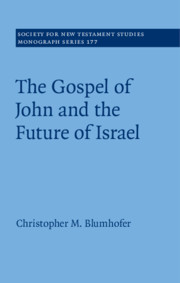Book contents
- The Gospel of John and the Future of Israel
- Society for New Testament Studies
- The Gospel of John and the Future of Israel
- Copyright page
- Dedication
- Contents
- Acknowledgments
- 1 Introduction
- 2 Announcement: John 1–4
- 3 Debate: John 5–10
- 4 Crisis: John 11–20
- 5 Conclusion: Implications for the Interpretation of John
- Select Bibliography
- Index
4 - Crisis: John 11–20
Published online by Cambridge University Press: 16 January 2020
- The Gospel of John and the Future of Israel
- Society for New Testament Studies
- The Gospel of John and the Future of Israel
- Copyright page
- Dedication
- Contents
- Acknowledgments
- 1 Introduction
- 2 Announcement: John 1–4
- 3 Debate: John 5–10
- 4 Crisis: John 11–20
- 5 Conclusion: Implications for the Interpretation of John
- Select Bibliography
- Index
Summary
The outline of this study presents the Gospel of John under three headings: the announcement of Jesus as the one who brings about the future of Israel (John 1–4), the debate over Jesus as the one who claims such a role (5–10), and finally the crisis engendered by belief in Jesus as the one who embodies the innovative means by which the people of God might live into their promised future in continuity with their storied past. In this sense, the crisis (κρίσις) described in John 11–20 is best understood as both the judgment and the division provoked by belief or disbelief in Jesus.1 Faced with a decision about Jesus, Judaism cannot but undergo a κρίσις, a judgment about the truth or falsehood of its path and a commitment to a way of life that expresses belief in or denial of Jesus as the Christ. The claim of this study is not that the Gospel was conceived upon such a simple outline (or a similar one), but rather that “announcement,” “debate,” and “crisis” are capable of catching up the arc of the Gospel narrative. In the final section of the Gospel considered here, readers encounter κρίσις as a prominent narrative feature after the raising of Lazarus results in belief in Jesus even among the ranks of the Ioudaioi (11:45–46; 12:11). Belief in Jesus among the Ioudaioi and then the crowd continues when Jesus is lauded as “king of Israel” (12:13). In contrast to what has come before, these scenes record no debate between those who believe in Jesus and those who do not. Instead, they record the judgment and division that takes place as people and groups accept or reject Jesus and then live into the consequences of their decisions. In chapters 11–20, John presents both the positive and the negative possibilities entailed in a decision about Jesus: positively, Jesus and his followers are characterized as innocent sufferers who faithfully carry out the commission of the Father and take up their places in God’s eschatological restoration of Israel; negatively, John describes the Jewish authorities as unqualified theological and political leaders; indeed, they persecute God’s chosen one. As we will see, these are the paths of faithfulness or unfaithfulness that belief in Jesus opens up for readers of John.
- Type
- Chapter
- Information
- The Gospel of John and the Future of Israel , pp. 176 - 211Publisher: Cambridge University PressPrint publication year: 2019

